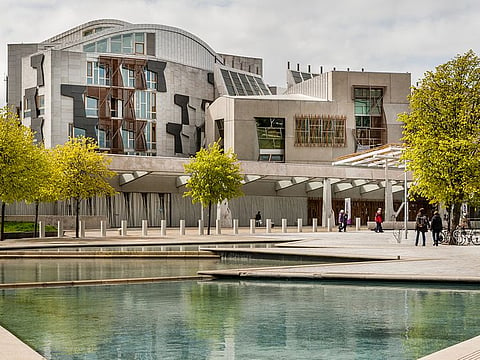Will the UK block Scotland’s contentious Gender Bill?
Critics worried about potential effect of the massive social change on young people

On Thursday last, a winter storm blew in across the Atlantic, dropping copious amounts of rain on the sodden fields of Britain. The further north I drove, heading to Edinburgh, the worse the driving conditions became.
By 4:30pm, when the cold darkness of early January truly set in, the borderlands and hills to the south of the Scottish capital were dark and foreboding. A bit like the prospect of Scottish independence itself.
As coincidence would have it, I spent the night in front of a gas fire in a hotel in Linlithgow — about 40 minutes’ drive from the centre of Edinburgh — once the district represented by Alex Salmond, the former head of the Scottish Nationalist Party and a man who served as the first First Minister of Scotland.
Recent political history hasn’t been kind to Salmond, and he fell out with his party and continues to be at loggerheads with the current First Minister, Nicola Sturgeon.
I’ve interviewed Salmond several times in the past — a pit bull of a man who eloquently lays out the case for an independent Scotland. Both he and Sturgeon were the face of the Yes campaign during that failed referendum campaign of September 2014.
Also Read: EU needs to gear up to fight climate change
Also Read: Two years of Brexit misery in the UK
But the case for independence, the nationalists say, is stronger than ever, given the way Brexit turned out — Scotland voted overwhelmingly to stay in the European Union — and with the recent ruckus in Westminster. Scots are quick to tell you that they haven’t voted for any Conservative Prime Minister in decades.
And what little remains, will almost certainly disappear in very quick fashion indeed if Prime Minister Rishi Sunak follows through on his stated intent to overrule a new Scottish law that makes it easier for people to officially change their gender.
In mid December, the SNP — with support from the Scottish Labour Party and the Greens — passed reforms that will make it much easier for people to legally change their gender.
Under Gender Recognition Reform Bill, anyone from the age of 16 onwards, can legally change their gender by simply self-identifying with one.
Up to now, the change could only be made if a medical professional made an official medical diagnosis of gender dysphoria.
No need for such a move
It’s difficult to say exactly how many people might be affected by this change in law, but it is legislation that has been hotly debated in the Scottish Assembly for months on end, with family and social conservative pressure groups arguing that there is simply no need for such a move.
The new law reduces the time required for somebody who wants to change their gender from two years to just three months, or six months for 16 and 17 year olds.
Opinion polls suggest that only one-in-five in Scotland think this is a good idea.
More to the point, opponents argue, is this the type of legislation that would become commonplace in a newly independent Scotland?
Surely, opponents say, aren’t there more important things that Scottish politicians can spend their time on? Things like fixing overcrowded emergency rooms in Scottish hospitals, providing funds for policing or to combat crime. Or make sure ambulances can get to calls quickly and effectively rather than waiting for hours on end at hospitals to offload the ill and infirm.
According to those opinion polls, less than 10 per cent of those questioned say they “strongly” support the new legislation. But it is not just Scotland.
One pollster asked people across the UK whether they want to see the changes in Scotland rolled out across the rest of the UK, as Keir Starmer and Labour have suggested they will do after the next general election.
The result: 80 per cent saying they would not support the measure.
Crucially, the opposition comes not only from conservatives, who see this as the latest example of a concerted effort by radical progressives to erode social values, but by many in the population.
As unsupported as the new legislation appears to be with Scottish adults, this law could become the latest flashpoint in relations between Edinburgh and London. If Sunak overrules it, it will simply add fuel to the fire for many Scots who believe that London is no longer working for them, and Westminster is irrelevant to their future.
In Scotland’s intensifying campaign to go its own way, gender choice is the latest front.



